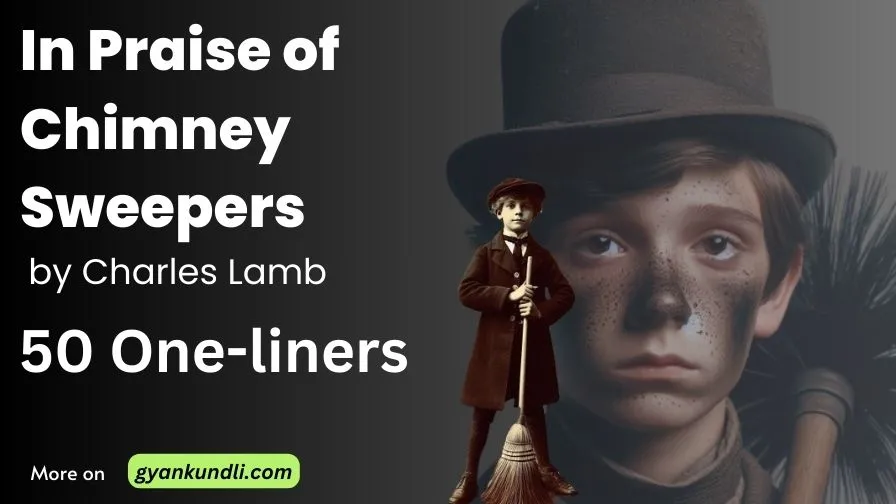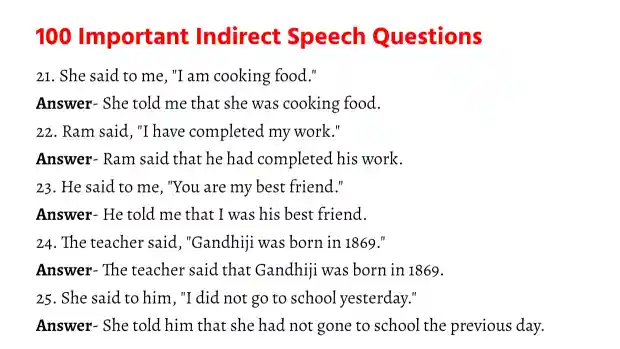Here are 50 One-liners on In Praise of Chimney Sweepers
- Q: What is the main theme of Charles Lamb’s essay “In Praise of Chimney Sweepers”?
A: The essay revolves around Lamb’s admiration and sympathy for chimney sweepers, highlighting their innocence, hardships, and hidden nobility.
- Q: How does Lamb describe the voice of chimney sweepers?
A: Lamb likens the voice of chimney sweepers to the chirping of sparrows, portraying it as tender and reminiscent of the matin lark.
- Q: What does Lamb suggest about the boys in dark clothes resembling clergyman?
A: Lamb suggests that these boys, despite their sooty appearance, preach patience through their hard work from their little pulpits atop chimneys.
- Q: Why was Lamb shocked at the sudden disappearance of chimney sweepers within chimneys?
A: Lamb was shocked because he feared for their safety, but he felt immense relief when they emerged safely on the roof with their brushes.
- Q: What does Lamb recommend readers do when they encounter chimney sweepers?
A: Lamb encourages readers to be generous, giving chimney sweepers a penny or two, and suggests offering them Sassafras tea to support their enthusiasm and prevent chimney fires.
- Q: How does Lamb describe a moment when he fell on the street and a chimney sweeper laughed at him?
A: Lamb, despite the embarrassment, didn’t get angry as the sweeper’s joy was innocent, and he appreciated the contrast of the sweeper’s white teeth against his black attire.
- Q: What is Lamb’s belief about some chimney sweepers being from noble families?
A: Lamb expresses the belief that some sweepers might be kidnapped from noble families in their infancy and forced into this work, citing their civil and courteous behavior.
- Q: Whom does Lamb praise for their sympathy towards chimney sweepers?
A: Lamb praises his friend Jem White, who annually hosted a dinner for chimney sweepers on St. Bartholomew’s Day in Smithfield, showing great care and dignity.
- Q: How does Lamb describe the suffering children in his essay?
A: Lamb’s essay reflects his attitude, love, and sympathy for the suffering children, emphasizing their hardships and the need for compassion.
- Q: How does Lamb describe Saloop, and what does he associate it with?
A: Lamb describes Saloop as a composition made from the sweet wood called sassafras. He associates it with early gardeners, the delight of the herb-woman, and the envy of unpennied sweeps.
- Q: Why does Lamb suggest regaling a chimney sweeper with a sumptuous basin and bread and butter during Saloop dispensing?
A: Lamb suggests this to potentially lighten one’s culinary fires and prevent the tainting of well-ingredienced soups by the descending soot.
- Q: What caution does Lamb give regarding the chimney-sweeper’s eating habits?
A: Lamb advises chimney sweepers to be careful not to crack their teeth, as teeth are considered their best patrimony.
- Q: How does Lamb describe the atmosphere during the dispensing of Saloop in the early morning?
A: Lamb describes the atmosphere as filled with the least satisfactory odors, especially during the meeting of the rake and the artisan.
- Q: What does Lamb suggest may happen if you regale a chimney sweeper with a sumptuous basin and bread and butter?
A: Lamb suggests that regaling a chimney sweeper may result in culinary fires producing a lighter volume to the welkin and preventing the tainting of well-ingredienced soups.
- Q: How does Lamb generally feel about street affronts from the populace?
A: Lamb is generally sensitive to street affronts but can endure the jocularity of a young sweep with more than forgiveness.
- Q: What happened during Lamb’s winter walk along Cheap-side?
A: Lamb had a treacherous slide, fell on his back, and was laughed at by a chimney sweeper, but he faced it down with pain and shame.
- Q: How does Lamb describe the roguish grin of the young sweeper who encountered him after his fall?
A: The young sweeper stood with a roguish grin, pointing Lamb out to the crowd, reveling in the humor as if the jest would last forever.
- Q: What is the significance of the young sweeper’s joy?
A: The young sweeper’s joy, with no malice, is considered a maximum of glee and a minimum of mischief in his mirth.
- Q: Why could Lamb endure the mockery and laughter of the young sweeper till midnight?
A: Lamb appreciated the genuine joy and innocence in the sweeper’s laughter, making him willing to endure the mockery.
- Q: How does Lamb usually feel about a fine set of teeth?
A: Lamb is generally obdurate to the seductiveness of a fine set of teeth, considering them as bones.
- Q: Why does Lamb find a display of white and shining teeth by a chimney sweeper agreeable?
A: The display of white and shining teeth by a chimney sweeper strikes Lamb as an agreeable anomaly in manners and a piece of allowable foppery.
- Q: What comparison does Lamb make regarding the display of teeth?
A: It is compared to a sable cloud turning forth her silver lining on the night, suggesting an unexpected and pleasant contrast.
- Q: What does Lamb mean by “May the Brush supersede the Laurel!”?
A: It is a crowning sentiment during the toasts, expressing a wish for the chimney sweeper’s brush to surpass the laurel in recognition.
- Q: How does Lamb describe the head waiter, James White’s, role at the feast?
A: James White, as the head waiter, had charge of the first table during the chimney-sweepers’ feast.
- Q: How does Lamb describe the atmosphere during the feast of chimney sweepers in Smithfield?
A: There was clambering and jostling for positions, with universal hosts shouting, and grinning teeth brightening the night.
- Q: What was the inaugural ceremony of James White at the feast?
A: James White’s inaugural ceremony involved clasping the greasy waist of an old dame and kissing her lips.
- Q: What is the significance of the sausages at the feast?
A: The sausages were a savory part of the feast, and their aroma delighted the young chimney sweepers.
- Q: What were the toasts proposed during the feast?
A: The toasts included “The King,” the “Cloth,” and a crowning sentiment: “May the Brush supersede the Laurel!”
- Q: How did James White deal with distributing sausages and small ale?
A: He dealt with sausages and small ale in a genteel manner, recommending slices of bread, wiping lips, and naming the brewer.
- Q: What was the special recommendation given by James White?
A: James White recommended wiping the lip before drinking, emphasizing the importance of cleanliness.
- Q: Why does Lamb say that the tradition of chimney-sweepers’ feasts has long ceased?
A: James White, the initiator of these suppers, is extinct, taking away half the fun of the world with him.
- Q: What do Lamb’s old clients look for among the pens?
A: Lamb’s old clients look for him among the pens, missing him and reproaching the altered feast of St. Bartholomew.
- Q: What does Lamb say about James White and the glory of Smithfield?
A: The glory of Smithfield has departed with James White’s death, and his absence is felt by those who once enjoyed his lively presence.
- Q: Why does Lamb consider James White’s death as taking away half the fun of the world?
A: James White carried away half the fun of the world when he died, at least in Lamb’s world.
- Q: What are visitors curious about when they visit Arundel Castle?
A: Visitors, especially those curious about the beds, find Arundel Castle interesting, particularly for its beds.
- Q: What was discovered in one of the state-beds at Arundel castle?
A: A lost chimney-sweeper, a little creature, was discovered fast asleep in one of the state-beds at Arundel Castle.
- Q: How did the chimney-sweeper end up in the state-bed at Arundel Castle?
A: The chimney-sweeper, exploring chimneys, somehow ended up in the state-bed after tiring explorations and chose to sleep there.
- Q: What description does Lamb give of the sheets in the state-bed at Arundel castle?
A: The sheets were whiter and softer than the lap where Venus lulled Ascanius.
- Q: What does Lamb suggest about the chimney-sweeper’s behavior in the state-bed?
A: Lamb suggests a high instinct at work, prompting the chimney-sweeper to venture into the bed due to a deep, unconscious memory.
- Q: Why does Lamb think the chimney-sweeper may have ventured into the state-bed at Arundel Castle?
A: Lamb believes that the chimney-sweeper may have been allured by a memory of his condition in infancy when he was lapt in similar sheets.
- Q: What does Lamb propose as the explanation for the chimney-sweeper’s audacious act in the state-bed?
A: Lamb suggests that the chimney-sweeper’s action is prompted by a sentiment of a pre-existent state, a memory from infancy.
- Q: What does Lamb mean by “undeceiving of the world”?
A: Lamb refers to the chimney-sweeper’s action as a way of undeceiving the world, revealing a hidden nobility beneath the soot.
- Q: What annual feast did Lamb’s friend Jem White institute for chimney sweepers?
A: Jem White instituted an annual feast of chimney-sweepers, held in Smithfield on the yearly return of the fair of St. Bartholomew.
- Q: What did Jem White do at the feast of chimney-sweepers?
A: Jem White officiated as host and waiter at the feast, taking charge of the arrangements and serving the chimney sweepers.
- Q: Why does Lamb say the feast of chimney-sweepers was a solemn supper?
A: The feast was solemn, emphasizing the significance of the occasion and the respect accorded to the chimney sweepers during the annual event.
Absolutely! Let’s continue with more insightful questions related to “In Praise of Chimney Sweepers” by Charles Lamb.
- Q: What does the author compare the chimney-sweepers’ professional notes to?
A: The author compares their notes to the peep peep of a young sparrow or the matin lark.
- Q: What does the author call the chimney-sweepers who are born in England?
A: The author calls them young Africans of our own growth.
- Q: What lesson do the chimney-sweepers preach to mankind from their little pulpits?
A: They preach a lesson of patience to mankind.
- Q: What was the mysterious pleasure that the author experienced as a child when witnessing the chimney-sweepers’ operation?
A: The mysterious pleasure was to see them enter the chimney, follow them in imagination through the dark and stifling caverns, and then see them emerge in safety with their brushes.
- Q: What did the author hear when the chimney-sweepers discovered daylight?
A: The author heard their feeble shout of joy.
Discover more from Gyankundli
Subscribe to get the latest posts sent to your email.


















